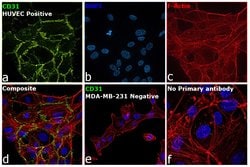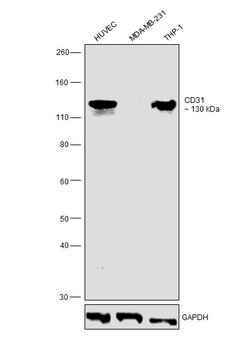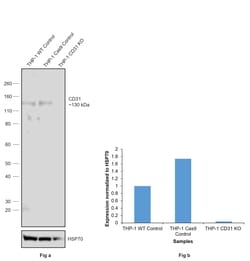Learn More
Invitrogen™ CD31 (PECAM-1) Monoclonal Antibody (Gi18), eBioscience™
Mouse Monoclonal Antibody
Supplier: Invitrogen™ BMS137

Description
Description: The antibody BMS137 recognizes platelet endothelial cell adhesion molecule 1 (PECAM-1) also known as CD31, a transmembrane glycoprotein with a molecular weight of approximately 130 kDa, depending on the degree of glycosylation. PECAM-1 is constitutively expressed on all vascular cells and has provided a useful immunohistochemical marker of blood vessels, particularly in the setting of angiogenesis. It has also been found on platelets, monocytes, neutrophils and CD8+ T cells. Bone marrow stem cells and transformed cell lines of the myeloid and megakaryocytic lineage also express PECAM-1. Interestingly, PECAM-1 was also detected on human, mouse and rat solid tumor lines. Recent studies suggest a role for PECAM-1 in the inflammatory process and leukocyte-endothelial interaction. PECAM-1 is an early and sensitive marker for tumor-induced angiogenesis. Several data have suggested that PECAM-1 may be involved in the process of angiogenesis in a developing vertebrate embryo as well as during metastases formation. Applications Reported: This BMS137 antibody has been reported for use in ELISA, western blotting under non-reduced conditions, cell staining followed by both FACS and flow cytometric analysis, immunohistochemical staining of both frozen and FFPE tissues. Applications Tested: This BMS137 antibody has been tested by western blot analysis and immunohistochemistry on human FFPE tissue using both low and high pH antigen retrieval at 30 μg/mL. It is recommended...
CD31 (platelet endothelial cell adhesion molecule-1, PECAM-1) is an inhibitory coreceptor involved in regulation of T cell and B cell signaling by a dual immunoreceptor tyrosine-based inhibitory motif (ITIM) that upon associated kinases-mediated phosphorylation provide docking sites for protein-tyrosine phosphatases. CD31 is expressed ubiquitously within the vascular compartment and is located mainly at junctions between adjacent cells. N-terminal Ig-like domain of CD31 is responsible for its homophilic binding, which plays an important role in cell-cell interactions. CD31 is a multifunctional molecule with diverse roles in modulation of integrin-mediated cell adhesion, transendothelial migration, angiogenesis, apoptosis, negative regulation of immunoreceptor signaling, autoimmunity, macrophage phagocytosis, IgE-mediated anaphylaxis and thrombosis. It is one of key regulatory molecules in vascular system.
Specifications
| CD31 (PECAM-1) | |
| Monoclonal | |
| 1 mg/mL | |
| PBS with no preservative; pH 7.2-7.4 | |
| P16284 | |
| Pecam1 | |
| Rec. Human CD31 (PECAM-1). | |
| 100 μg | |
| Primary | |
| Human | |
| Antibody | |
| IgG1 |
| ELISA, Flow Cytometry, Immunohistochemistry (Frozen), Immunohistochemistry (Paraffin), Western Blot, Immunocytochemistry | |
| Gi18 | |
| Unconjugated | |
| Pecam1 | |
| C85791; CD31; CD31 antigen; CD31, PECAM-1; CD31/EndoCAM; endoCAM; GPIIA'; I79_008304; PECA1; Pecam; PECAM1; Pecam-1; platelet and endothelial cell adhesion molecule 1; platelet endothelial cell adhesion molecule; platelet endothelial cell adhesion molecule-1; platelet/endothelial cell adhesion molecule (CD31 antigen); platelet/endothelial cell adhesion molecule 1; type I transmembrane endothelial adhesion molecule | |
| Mouse | |
| Affinity chromatography | |
| RUO | |
| 5175 | |
| 4°C | |
| Liquid |
The Fisher Scientific Encompass Program offers items which are not part of our distribution portfolio. These products typically do not have pictures or detailed descriptions. However, we are committed to improving your shopping experience. Please use the form below to provide feedback related to the content on this product.




